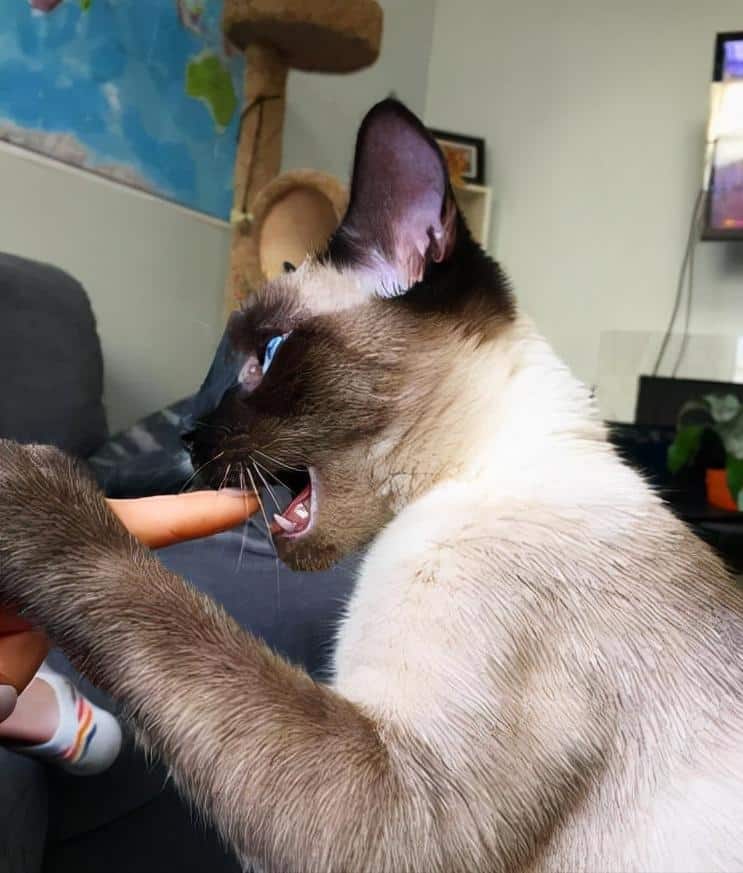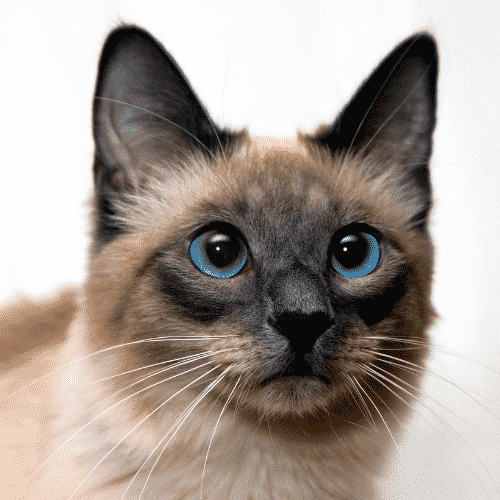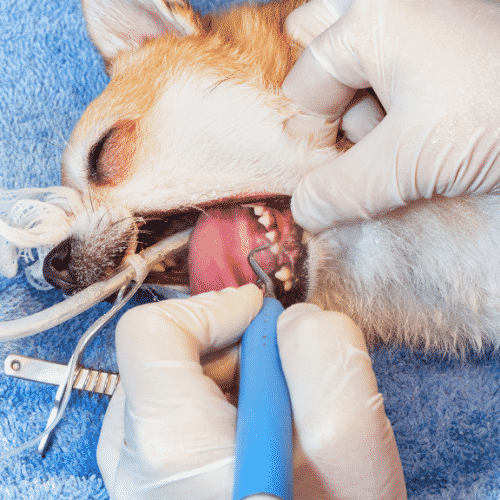The Siamese cat, which originated in Asia, is considered one of the world’s oldest domesticated cat breeds. These cats are attractive and friendly, which is why most people keep them as pets. However, unlike other cat breeds, these cats have the drawback of being talkative, occasionally aggressive, and bite more than other breeds. But why is that? Why do Siamese cats bite so much?

One of the reasons Siamese cats bite so often is because they get overexcited during excessive playing or during any complex activity. It’s in their genetics. They are full of energy, and overexcitement or lack of attention may lead to biting. You must understand that Siamese is full of energy, and they must burn it daily to keep healthy and active. If you do not give enough attention to your cat. It may lead to biting.
When your Siamese becomes hyperactive/overexcited, her pupils become more prominent and change their way of vocalizing. During that period, whenever you disturb your Siamese, it will bite. Your cat may bite your arm or hand due to increased senses and excitement.
There are several other reasons for this, including fear or excessive petting. Siamese cats are naturally energetic, and as a result, they all have the energy to play with their families. However, everything will be fine and lovely up to the point when one of your children is bitten by one of your Siamese cats.
Let’s discuss all the reasons in detail which lead your Siamese to bite more than other cats.
Do Cats Protect You While You Sleep?
Reasons Why Your Siamese Cat Bites So Much
The following are some of the reasons why a Siamese cat may bite:
- Fear
- Uncomfortability
- Quick temper
- Irritation
- Lack of Affection
- Predatory Instinct
- Petting
Fear
Your Siamese cat may bite more than she should because she’s terrified of something. It might be due to introducing a new pet or the arrival of unexpected guests. Moving to a new home or bringing a new pet or member of the family into the house might cause stress in a cat. Even though Siamese cats are friendly with other cats and pets, it may take some time to become used to their new home and environment. If your cat is skittish, makes a lot of irregular movements, and hisses, then there is a good possibility that it is terrified of something or someone, and you should make an effort to discover what it is afraid of.
Uncomfortability
Siamese cats may have always been described as diva-like, but if they have experienced trauma in the past, they may find themselves uncomfortable in almost any circumstance. Anyone who approaches a cat when it is not in the mood to interact with people runs the risk of getting bitten.
Quick Temper
Siamese cats are known for their extreme sensitivity. When you pick her up, you run the risk of getting bitten by her. It doesn’t take much to get a Siamese cat angry, and when she does, she won’t think twice about biting or scratching you.

Siamese cats can become aggressive. It doesn’t matter if you walk right by her or not; she’ll still bite your ankle.
Keeping your Siamese cat contented and well-fed is the best way to prevent mood swings in your pet.
Irritation
The Siamese breed is not just short-tempered but also quickly irritated. It may be just something that comes naturally to him, but another possibility is that he’s suffering from an ailment or some pain. If he is unwell and unwilling to play a game, he will bite anyone who tries to compel him to participate.
Lack of Affection
Siamese cats are naturally intelligent. They like the companionship of humans, but if they become aware that their favorite person has been absent for several days, they will become quite upset. As a kind of revenge for your careless behavior, he will remind you not to repeat it with a surprising bite.
Predatory Instinct
Due to their predatory nature, cats have the instinct to bite. This is possible even if they are domesticated, and it may occur whether you are snuggled up in bed or sitting on the sofa. The instinct to bite is inherent in every cat’s genetic code. As a result, every cat seems to bite at some point, most likely frequently. When getting a new feline friend, potential owners of cats should be aware of this possibility and be prepared to deal with it. You should prepare yourself for a playful bite from your cat, and as long as no one is hurt, there is no problem with it. It provides the cat with a reward and enjoyment, so there is no reason to worry about it.
Petting
When you try to pet some cats, they may bite you since they dislike being touched in the first place.
On the other hand, it is quite unusual for a loving cat such as a Siamese cat to bite when being petted. The majority of Siamese cats will meow at you and demand attention before allowing you to pet them.
Why Does My Cat Meow When I Pick Her Up?
How to Stop a Siamese Cat From Biting?
Here is some advice on preventing a Siamese cat from biting so frequently. These are the following:

- Show your kitty some love.
- Teach your cat biting inhibition
- Get cat toys
- Have some fun with your cat
Pay attention to when your cat bites and what causes it to do so. It will assist you in determining the strategy that will work best to stop this habit.
Why Does My Siamese Cat Bite Me While I’m Petting Him?
Petting can provoke aggressive behavior in cats of many breeds, not just in Siamese cats. Cats can only handle a certain amount of attention before becoming overstimulated. Because of this, the cat may lash out to want the petting to stop because it might feel unpleasant. Cats will display warning behaviors before biting, such as twitching their tails, snarling, experiencing a rapid dilation of their pupils, or rippling the skin along the back.
Why Do Cats Punch? (Hitting You With Their Paws!) – Top 5 Reasons
When Siamese Bite Themselves?
Some cats, particularly Siamese, become so distressed by the presence of a new pet or a stray cat that they groom and bite themselves aggressively.
Instead of attacking you, they bite themselves in this kind of displacement violence. If the cat makes this behavior a habit and starts hurting itself. As a result, you should take the cat to the veterinarian for assistance as soon as possible.

Doctor of Veterinary Medicine (D.V.M.) at Nation Taiwan University,Master of Science (M.S.) in Biomedical Engineering at National Taiwan University of Science and Technology




